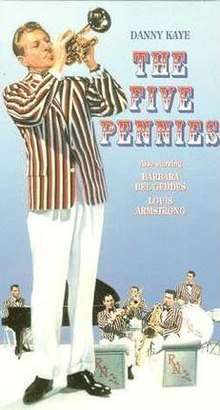The Five Pennies
The Five Pennies is a semi-biographical 1959 film starring Danny Kaye as cornet player and bandleader Loring Red Nichols. Other cast members include Barbara Bel Geddes, Louis Armstrong, Harry Guardino, Bob Crosby, Bobby Troup, Susan Gordon, and Tuesday Weld. The film was directed by Melville Shavelson.
| The Five Pennies | |
|---|---|
 | |
| Directed by | Melville Shavelson |
| Produced by | Jack Rose |
| Written by | Robert Smith Jack Rose Melville Shavelson |
| Starring | Danny Kaye Barbara Bel Geddes Louis Armstrong Harry Guardino Bob Crosby Bobby Troup |
| Music by | Thorton W. Allen Sylvia Fine M.W. Sheafe Leith Stevens |
| Cinematography | Daniel L. Fapp |
| Edited by | Frank P. Keller |
| Distributed by | Paramount Pictures |
Release date |
|
Running time | 117 minutes |
| Country | United States |
| Language | English |
| Box office | $3 million (est. US/ Canada rentals)[1] |
The film received four Oscar nominations: Best Musical Scoring (Leith Stevens), Best Original Song (Sylvia Fine—Danny Kaye's wife), Best Cinematography (Daniel L. Fapp), and Best Costumes (Edith Head).
The real Red Nichols recorded all of Kaye's cornet playing for the film soundtrack. The other musicians in Red's band were not asked to provide their musical contributions, and the sound of his band was supplied by session players.
Plot
Red Nichols (Kaye) is a small-town cornet player who moves to New York City in the 1920s and finds work in a band led by Wil Paradise (Crosby). He meets and marries singer Willia Stutsman, a.k.a. "Bobbie Meredith" (Bel Geddes). Red and his friends Jimmy Dorsey, Glenn Miller, Artie Schutt and Dave Tough form their own Dixieland band called "The Five Pennies" (a play on Nichols' name, since a nickel equals five pennies). As their popularity peaks, the Nichols' young daughter Dorothy (Susan Gordon) contracts polio, and the family leaves the music business, moving to the balmier climate of Los Angeles, where Nichols works in the shipyards and both parents help Dorothy work on her recovery.
As a teenager, Dorothy (Tuesday Weld) learns of her father's music career and persuades him to make a comeback. His first attempts to play a horn (he threw his own treasured instrument into the San Francisco Bay in despair when Dorothy was ill) are a miserable failure. Eventually he listens to his wife and daughter, and practice restores his skill. His old friend Tony Valani (Guardino), now a huge success, gets him a gig to perform at a small club, with The New Five Pennies. Nichols, nervous and terrified of splitting his lip, is disappointed when he sees no other old friends in the audience. He opens the show, and after a few notes, “Won't you come home Bill Bailey?” echoes through the dark. The lights comes up, and it is Satchmo and his friends. Willa comes up on stage and tells him she has a surprise for him. Dorothy steps onto the dance floor without her cane and asks her father to dance. Willa sings “This little penny is to wish on...” while they do. Then Nichols takes his horn and plays “Glory Hallelujah!” His friends join in.
Cast
- Danny Kaye as Red Nichols
- Barbara Bel Geddes as Willa Stutsman (her singing voice is dubbed by Eileen Wilson)
- Louis Armstrong as Himself
- Harry Guardino as Tony Valani
- Bob Crosby as Will Paradise
- Bobby Troup as Arthur Schutt
- Susan Gordon as Dorothy Nichols - Ages 6 to 8
- Tuesday Weld as Dorothy Nichols - Age 13 to 14
- Ray Anthony as Jimmy Dorsey
- Shelly Manne as Dave Tough
- Ray Daley as Glenn Miller
- Valerie Allen as Tommye Eden
- Bob Hope as Himself (cameo)
Music
Eleven composers are credited in the film.[2]
Reception
New York Times critic A.H. Weiler reported that the “solicitous dramatization of the harried life and times of that noted jazz man, Loring (Red) Nichols, the tune-filled story... is highly palatable schmaltz served up with a Dixieland beat by some authentic performers, musical and otherwise.” He found Kaye's performance particularly fine on many levels.[3]
See also
References
- "1959: Probable Domestic Take". Variety. 6 January 1960. p. 34.
- "The Five Pennies (1959) - Music - TCM.com". Turner Classic Movies. Retrieved 2020-06-10.
- Weiler, A. H. (1959-06-19). "The Five Pennies'". The New York Times. ISSN 0362-4331. Retrieved 2020-06-10.